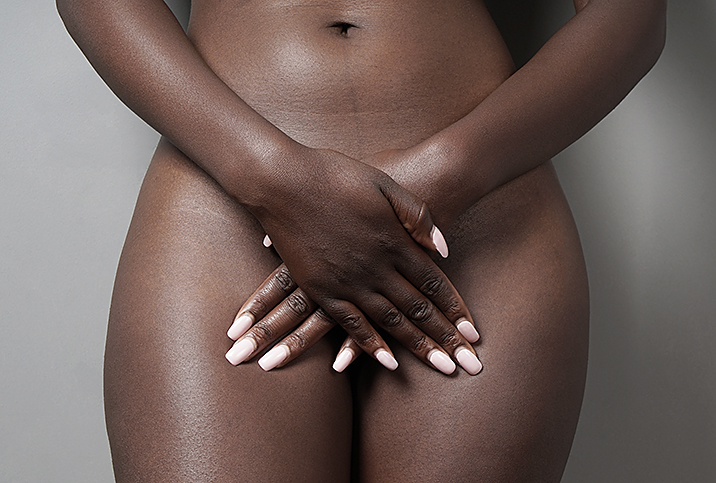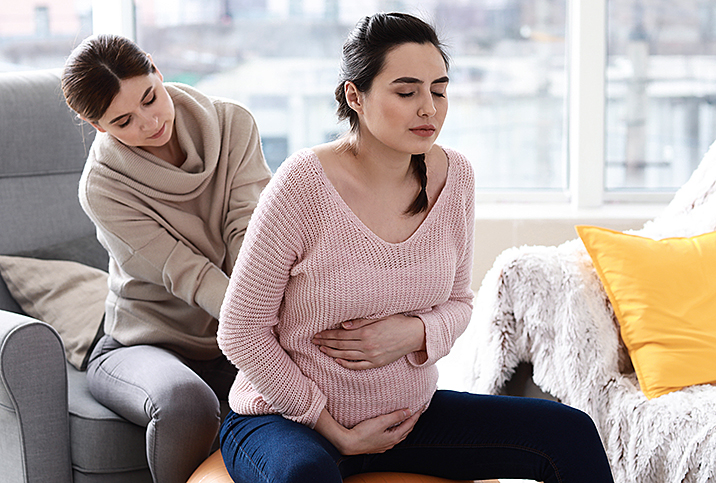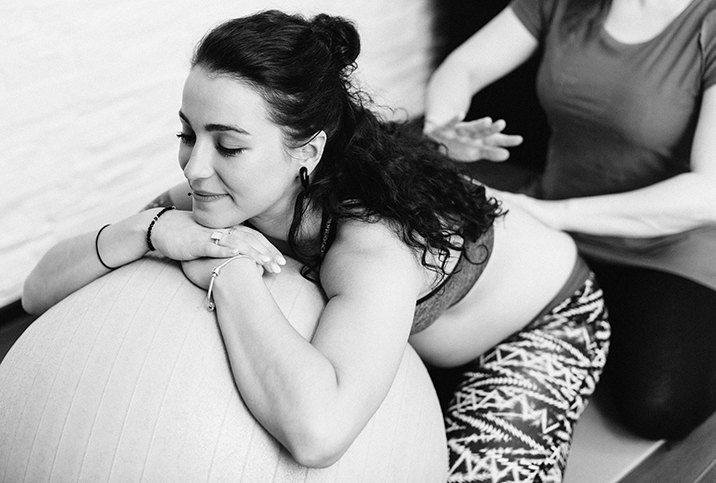Doulas Will Be Covered by Medicaid Under New Rhode Island Law

Five days after the birth of her twin boys, Rhode Island State Representative Marcia Ranglin-Vassell (D-Providence) found herself suffering from a headache unlike anything she had ever experienced before. "It had gotten so bad that I tried keeping my head in the freezer for relief," stated Ranglin-Vassell. "I knew it was more than a migraine."
Returning to the hospital and the doctor who had assisted in the birth of her newborns, Ranglin-Vassell found out she had a subarachnoid hemorrhage, a rare but serious complication of pregnancy, on the right side of her brain. While she'd had a positive, functional pregnancy, the traumatic days following her birthing experience served as an alarm about the kind of care women receive before, during and after their children enter the world.
Ranglin-Vassell's health scare led her to wonder how the experiences of other Black mothers compared. "At first, I wanted to know why and how something so bad could happen to me," recalled Ranglin-Vassell. "Then I started thinking about my mother's best friend and how she died during childbirth. It was around then that I started connecting the dots."
Ranglin-Vassell's twins were born in 1996, but the memory was still fresh in her mind after she was elected to the Rhode Island House in 2016.
"After I got elected, all of these things made me want to create legislation that would investigate the outcomes of Black women who are dying [at rates] three to four times higher than their white peers," Ranglin-Vassell said. "It had to do with disparities and access. It had to do with the inherent racist healthcare system. All of these things were the catalyst for this bill."
In 2018, Ranglin-Vassell, in collaboration with Rhode Island birth workers, policymakers and healthcare providers, started work on what eventually became the Rhode Island Doula Bill, a piece of legislation meant to address the most profound disparities in maternal health. Team member Jumoke Akinrimisi drafted the first version of the bill, a proposal that looked into the role of doula care for improving the overall experience for birthing people and families.
On February 25, 2021, Ranglin-Vassell and colleagues introduced the Rhode Island Doula Bill to the Rhode Island House of Representatives. Under the bill, services from a qualified, trained doula are eligible for coverage through both private insurance and Medicaid. The bill allows for reimbursement of up to $1,500 per pregnancy. In addition, establishing industry standards allows those who are pregnant to connect with qualified professionals, and enables doulas to receive fair pay for their services. Only a few other states offer Medicaid coverage for doula services.
State Senator Ana B. Quezada (D-Providence) sponsored the bill in the Rhode Island Senate, along with several cosponsors and supporters. Members of community-based organizations Sista Fire RI and Doulas of Rhode Island advocated and testified for the bill throughout the legislative process. It was signed into law on July 9, 2021.
Making doula services more accessible to birthing families
According to the Rhode Island Families Deserve Doulas website, a doula is a "professional support person for the childbearing year" who "provide[s] informational, physical, emotional, and advocacy support for pregnant people and their families."
Doulas offer pregnant, birthing and postpartum women and their families support, and allow the parties mentioned above to explore the childbearing experience inside and outside of the clinical space. "Doulas have been around for centuries, called by different names, usually local women doing the work in their neighborhoods…taking care of each other during childbirth and postpartum," states Ranglin-Vassell. "But now, doulas are getting known on a national radar."
The most appealing aspect of working with a doula throughout pregnancy is the level of comfort that comes from having a local, familiar face facilitating the process. "The current U.S. healthcare system is partnered, meaning there are physician groups where a number of providers may rotate in treatment of a patient," stated Tekara Gainey, founder of the Philadelphia-based Black Moon Doula Services.
Gainey, who began her doula journey in 2012, notes that it can be stressful for a woman to go into labor and not have access to the doctor who has been working with her throughout the pregnancy. "The nursing staff is also constantly shifting in and out during hospital births. Working with a doula throughout your pregnancy allows you to have an intimate connection, cheerleader and advocate with someone who is there for your entire journey."
While Ranglin-Vassell doesn't know for sure if having a doula would have changed her birthing experience, research and personal experiences have shown her and her colleagues that it's certainly possible.
Black maternal and infant mortality rates across the United States are dire
In the United States, Black women are 3 to 4 times more likely to die in childbirth than white women, regardless of socioeconomic status. The Centers for Disease Control and Prevention (CDC) has reported that in Rhode Island, Black women suffer 3 times as many pregnancy-related deaths (PRDs) as white women per 100,000 live births. These alarming death rates for Black women in Rhode Island come hand in hand with a harrowing infant mortality rate. At 9.4 pregnancy-related deaths per 1,000 live births, the Black infant mortality rate is almost double that of white infants.
Gainey believes that doulas can help.
"Institutional racism affects how Black and Brown [people] experience healthcare," Gainey said. "And doulas are, before anything else, advocates for the birthing person. With an increased number of birthing people having access to doulas, more pregnant Black and Brown people will have an advocate in their corner, providing education and information so that they are fully aware of all their options during the birthing experience."
Complications during cesarean sections are among the highest factors in pregnancy-related deaths
In addition to being an important step in reducing Black maternal and infant mortality, doula intervention also lowers the likelihood of unnecessary procedural interventions during normal, healthy pregnancies.
"Depending on how long a doula has been doing the work, they will have seen enough birth processes to have a good gauge of the natural physiology of birth," stated Gainey. "We can reassure individuals of what is normal or abnormal by drawing on that natural gauge while encouraging their [instinctual] fluidity and movement. In hospitals, there can be high-control maintenance as a response to these questions."
Cesarean sections are one of these frequent procedural interventions. While C-sections can often be lifesaving for both mother and baby, the surgery also carries serious risks. Surgical delivery complications are among the highest factors in maternal death. Doula intervention has the potential to lessen these complications. Research has shown that, when assisted by a doula, women have lower odds of nonindicated cesareans than those who did not have a doula.
"I believe that doulas empower people to speak for themselves, to know their rights, and to honor their birth preferences," stated Gainey. "We help shift the power dynamics by providing the information and tools a birthing person and their family need in order to become participants, instead of just having things done to them. This lessens the chances of unnecessary interventions, and continuous surveillance."
While providing clinical professionals with cultural competency training is one possible avenue, dedicating energy and resources to doulas allows for a community-powered, patient-centered option to grow. In low-income communities, doulas, midwives and other community members of color have provided support for pregnant people in their neighborhoods for years. Community-based doula services, such as those provided by members of the Doulas of Rhode Island directory, promise all-encompassing support for the pregnant person, with the patient's wants and needs at the forefront of the plan.
However, while the statistics may point to doulas being a direct service fix to maternal and infant mortality rates, Gainey warns against framing the solution around doulas, and to instead take a closer examination at the structure of the healthcare system.
"When I am asked why the research shows that doulas may make room for this decrease in deaths, I am a bit hesitant to answer," said Gainey. "My purpose in the birthing space is not to decrease hospital cesarean rates, or to decrease how many birthing people get an epidural. I am there to preserve an individual's experience. What the research is really showing us is that there is an institutional problem that one group of individuals—doulas—cannot and should not be expected to solve. It takes an integrative approach. Top-down, bottom-up, side-to-side, in order to address the poor health outcomes and poor labor experiences."
Shaping a good and just birthing future
Gainey is all too familiar with the fear that draws many Black pregnant people to her doula services. "When I receive a call, I always ask, 'What made you want to get a doula?' And for the most part, I hear Black birthing people say, 'I'm afraid of dying.'"
A lot of the work around creating a sensitive, high-quality, holistic birthing environment requires addressing the fear first. Circulating horror stories about deaths on operating tables during birth are terrifying, even more so because they are rooted in fact, not just stigma.
"To me," Gainey stated, "a good birthing future empowers Black birthing people and their families to ask questions, have conversations, and to place the intuition and wants of the pregnant person at the forefront of the entire birthing process."
When asked what a good and just birthing future looks like for people in Rhode Island and beyond, Ranglin-Vassell declared "a future where the birthing person and the baby come out alive." Ranglin-Vassell also pointed out that the impact of the childbearing experience on health goes well beyond the day of delivery. "A good outcome would be parent and baby coming out alive, yes, and also [a future where] the quality of life is excellent for both."
"My grandson, the son of one of my twins, turns 3 today. When I look at him, I can't help but think, 'Wow. I almost missed this.' And I think of my friend, who also delivered twins and didn't make it. I think of the people I knew growing up who had no access to quality care. I think of 27-year-old Lashonda [Hazard], who died along with her unborn baby after doctors did not take her concerns seriously. This bill is for them. This bill is for all women and birthing people who want culturally competent, compassionate care."
The Rhode Island Doula Reimbursement Act will take effect on July 1, 2022.

















